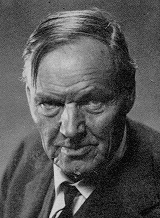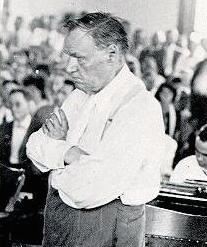

Clarence Darrow
Probably the most celebrated American lawyer of the 20th century, Clarence Darrow worked as defense counsel in many widely publicized trials. He was notable as a defender of the underdog and civil rights.
Clarence Darrow was born on April 18, 1857, near Kinsman, Ohio. He attended Allegheny College and the University of Michigan briefly before being admitted to the Ohio bar in 1878 at the age of 21. In 1887 he moved to Chicago, where he soon was appointed city corporation counsel and later the general attorney for the Chicago and Northwestern Railroad. He resigned this position in 1895 to defend Eugene V. Debs, president of the American Railway Union, and other union leaders who had been arrested on a federal charge of contempt of court over difficulties arising out of the Pullman strike of 1894. Through this trial Darrow established a national reputation as a labor and criminal lawyer.
In 1902 President Theodore Roosevelt appointed him an arbitrator in the Pennsylvania anthracite coal strike. In 1907 he secured the acquittal of labor organizer William D. "Big Bill" Haywood for the murder of former Idaho governor Frank Steunenberg. After World War I he defended war protesters charged with violating state sedition laws.
The two most famous trials in which he participated took place in the 1920s. The first of these trials was the notorious Leopold-Loeb murder case of 1924. He saved Nathan Leopold and Richard Loeb from execution--but not from prison--for the murder of 14-year-old Robert Franks. [In the 1959 movie Compulsion, based on this case, Darrow was portrayed by Orson Welles.] In July 1925 Darrow defended high school teacher John T. Scopes, who was charged with violating Tennessee law by teaching evolution. [The photograph below was taken at the Scopes trial, which was the first trial to be broadcast live, on radio.] The prosecuting attorney in this famous "monkey trial" was William Jennings Bryan. Bryan died a few days after the trial. [The well-known play, Inherit the Wind, is a fictionalized version of this trial; in various movie versions of the play Darrow has been portrayed by Spencer Tracy, Jason Robards and Jack Lemmon.] His life was the subject of a one-man stage production starring Henry Fonda.
He died in Chicago on March 13, 1938.
